Items
Tag is exactly
fear
-
2020-03-24
From The Traditional to the Unknown: Moving from In-Person to Online Learning
Much like other college students in the spring of 2020, I did not know how to react to the news that a virus called COVID-19 had begun infecting major cities, towns, and people. As an avid gamer, it appeared to me as though we started heading down the path of a zombie apocalypse or something similar to that, such as the ones you see in Call of Duty. I can still remember where I was as a sophomore in college when my school decided that it needed to shut down, sending students back to their homes and moving classes to the online world. At the start of what became pandemonium, I was with my friends in one of their dorm rooms, and we watched as the former president of the school, with a panel of other officials, answered questions about the pandemic and how the institution would respond. From my perspective, it seemed that no one knew what to do, and it was disconcerting to see that the leaders of the school were themselves in a state of flux. But who could blame them? In many ways, that spring of 2020 was unchartered waters, where everyone, including our leaders, did not know what to do or how to set forth a concrete plan. The lack of certainty, as I recall, led many students to become unsure of how the school would handle classes, graduation, plans for reimbursement for housing and dining costs, and, most importantly, the health and safety of the students and faculty. From that moment in spring 2020, it seemed that the college landscape would never be the same. With that said, this leads me to the point of my story. When the school decided that all classes would go online for the remainder of the spring 2020 semester and the entirety of the following school year, 2020 - 2021, it seemed entirely new and, in some ways, scary. Never before had I taken online classes, let alone know how to operate a program called Zoom. When I read the newsletter from my school saying that the 2020-2021 academic year would be online, it seemed, from my view, almost pointless to make students do schoolwork at a time when everyone was more concerned about their health and not getting other people sick. From that perspective, I felt angry, confused, and dismayed about how online classes would work. More importantly, I wanted to know how professors would respond to the situation, hopefully having them recognize that they should not assign a traditional amount of school work for a semester course given the extenuating circumstances beyond the classroom and college. I can still recall taking my first online class, and I felt utterly lost. I did not know how to operate Zoom, I did not know how to interact with my professors and classmates by staring into a camera on my computer, and I did not know, at the start, how challenging it would be to feel motivated to do the schoolwork. The latter was a difficult obstacle to overcome as being back at home and not in a classroom made it easier to forgo doing school work for a day, creating a lackadaisical mindset that negated my ability to do my assignments in a timely manner. On top of that, not being able to physically see my professors, either in class or in their office, made it even more difficult to ask questions. As someone who typically raises an abundance of questions, it seemed to me that that was no longer possible. Having to send several emails back and forth and then only have a few minutes to speak with a professor on Zoom after or before class made the process more cumbersome. The transition from the traditional classroom setting to the unknown world of online learning was a significant curve ball created by the pandemic that made the last part of my sophomore year and my entire junior year feel less important. The online medium essentially made the coursework seem less valuable to me. Even though I lived on campus in my junior year, 2021 - 2022, at the height of the pandemic, the educational side of my college experience became impacted to such a degree that I found myself not as engaged about the work or the course material. To that end, I share this story because it is one of many about how the pandemic took a substantial bite out of educational processes from 2020 into 2021. The classroom never felt the same during the pandemic and when I was on campus in 2021. Everywhere was a ghost town. In many ways, having to go from the traditional classroom into the expansive world of online learning was not something I thought I needed to think about as a college student. Of course, no one could have predicted what was going to happen, making the situation during that time all the more difficult to accept. I look back on it now and realize that I did lose a year and a half of my college experience. It is an unfortunate outcome of the pandemic, but I am thankful that no one in my family passed away from the disease, and all of my friends were safe as well. I wish I could relive my sophomore and junior years as a regular college student. However, having gone to college in the midst of the pandemic is historic, and I want to tell other generations about this experience. It will be challenging for future students to know what it was like to go to school at the same time a rampant disease spread across the globe. On the flip side, I think going to college during this time shows resiliency and courage on the part of many people. I hope this story is one that many can relate to as we move forward from these troubling years and continue to grapple with the legacy caused by the pandemic. -
2024-05-07
Life Before and After COVID-19
Before COVID-19, no one thought twice about social interactions. After COVD-19 that's all people were thinking about. Something that was so normal and mindless became the one thing that people were afraid of. After lockdown was over, many people had social anxiety because they went form not seeing anyone to seeing everyone. People were so afraid of catching COVID-19 that they chose to be alone rather than live their life and make memories. Coming back to school after lockdown was so scary. I was so used to not having to see anyone or care about what anyone thinks because we had class from home. Seeing all these people, made me so self conscious of what people think and how to behave normally. It was almost as if I had never talked to people in my life. Even now in 2024, people don't interact in the same as before. It's more normal than ever to see people wearing masks. I feel that this is the new normal and we are probably never going back to how it was before COVID-19. -
2021-04-19
Brave
Covid 19 almost took away one of the most significant people in my life, my grandmother. The near loss of my grandmother due to COVID-19 made me realize the devastating impact infectious diseases can have on individuals and their families. It reinforced the importance of proactive measures to prevent disease spread and protect vulnerable populations, regardless of ethnicity or background. This experience made me strong enough and brave enough to provide my grandmother with the support and comfort needed during this scariest moment of my life. During my grandmother's battle with COVID-19, I learned firsthand how crucial it is to provide unwavering support and comfort to loved ones during challenging times. The emotional strength and presence I offered her made a significant difference in her recovery journey, reminding me of the power of love and compassion in the face of adversity. -
2020-03-14
Leah's experience with Covid
The objective of this story is my personal experience with Covid 19 and the shutting down of the world around us due to the health affects. At the beginning of the Covid 19 in 2020 where all schools were beginning to mandate the wearing of surgical masks to stop the spreading of the newly found disease, Personally I didn't expect this disease would shut down what we once knew as normal. In the early days of the pandemic my family was the ones who were reluctant to wear the masks, as we did not realize the danger that is to come. Only a few weeks had gone by and the schools and stores were beginning to shut down and everyone had begun to learn the severity of this pandemic. Doctors were turning away patients who were suffering with health issues caused by outside sources other than the pandemic, causing other lives to decline. As a middle school student watching the depletion of the world right before my eyes, I was afraid of what may come in the following years. I was afraid of the pandemic and what negative affects that it may bring to me and my older family members. I was also afraid of the new norm that I now had to get used to along with the remote learning and not being to hangout with my friends and family as I once did. -
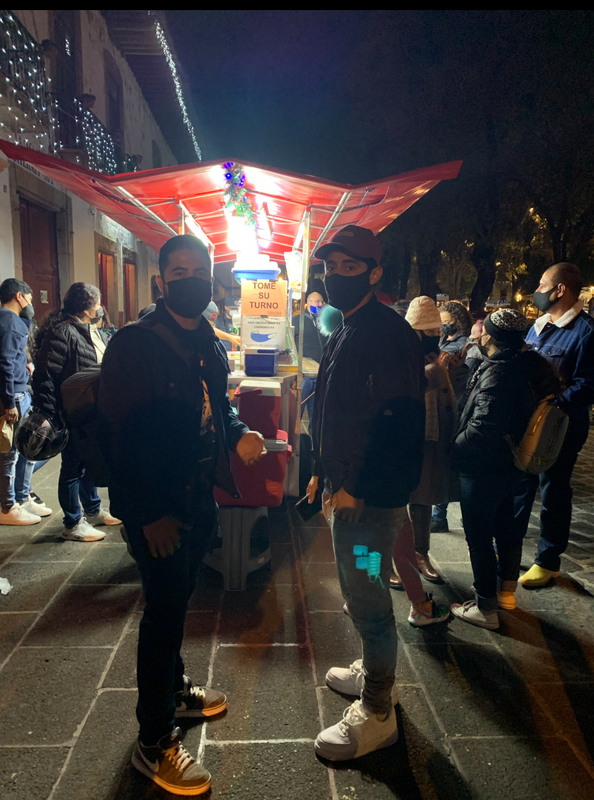 2020-12-26
2020-12-26Everyday life amidst a global pandemic
When the covid restriction lifted my husband and I decided to visit family in Mexico. Because of the ban we were not able to attend funerals, birthday parties or any type of celebration. Despite the pandemic and the restrictions life seemed to be about the same 8 months after the pandemic had first been announced with some small changes. In a street corner waiting to order food, everyone was wearing masks. The elderly, children and the vendors themselves which was surprising considering the push back there happened to be originally from the Latin communities. The solidarity in the mask enforcement had now came from fear. The people in the streets were scared but had to continue their jobs as vendors and others having to go out side and purchase from these same vendors despite the fear of getting sick. When I think back to the first year of the pandemic I think about small moments like these, something as simple as purchasing street food now came with a worry of possibly getting yourself or others sick. -
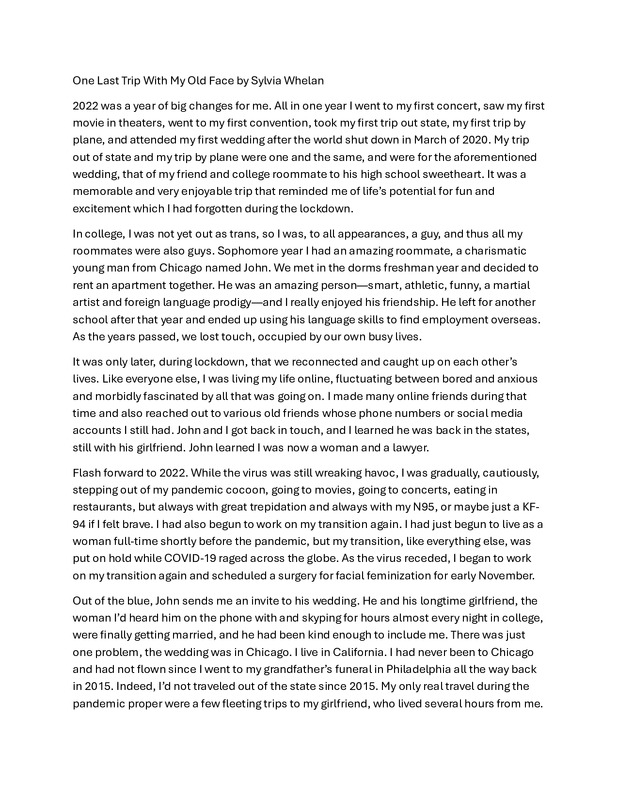 2022-10-16
2022-10-16One Last Trip With My Old Face
This is a story about my first trip out of state after the pandemic began. During lockdown, I reconnected with an old friend and was later invited to his wedding. It was my first time going to Chicago and I had a wonderful time. -
2021-03-18
A Burial Post Pandemic
I did not travel during the entirety of the strict lockdown period of the COVID-19 Pandemic. My wife and I worked in retail and were deemed essential so we worked through it from April 2020 until the restrictions were broadly lifted. In March 2021 my mother died of an unrelated illness, the first trip I took after the travel restrictions were lifted was to bury her in Carlsbad, New Mexico. We did not hold a funeral service and we did not hold a memorial, she was cremated and buried quietly. I remember this very vividly because even at that time it felt wrong to travel and to be interacting with people in a way that wasn't required by work. We wore masks the entire time. Due to our proximity to El Paso, TX I remember vividly when they were storing bodies in buses in the streets there and this made us fearful and cautious. Even had we not been still in the throes of the pandemic, I don't think I would have done anything differently but I do believe that the added stress of travel would not have been present thus making the trip more manageable. Due to our need to isolate, and resist getting sick, what I remember most of all is the loneliness of the matter, and the quiet car rides, and wondering 'How might things have been different?' -
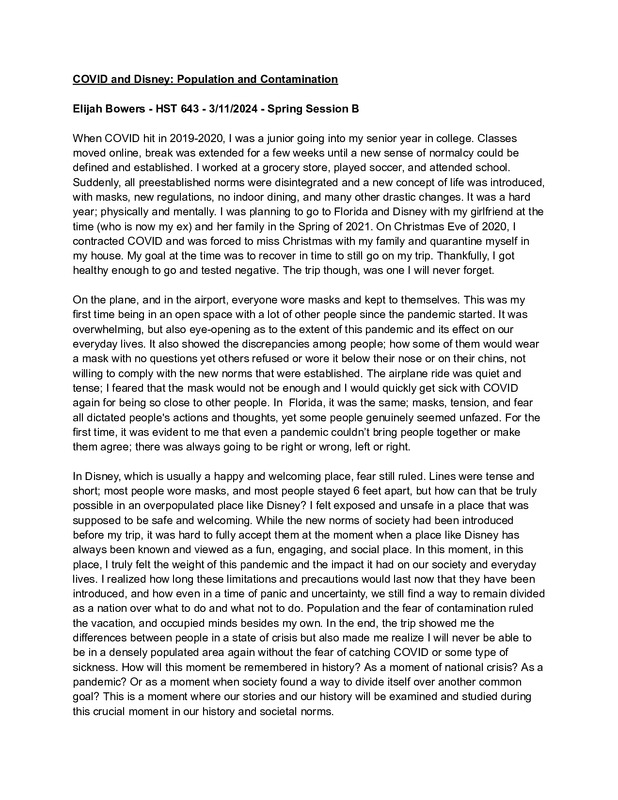 2020-12
2020-12COVID and Disney: Population and Contamination
This story discusses my trip to Disney and Florida following the pandemic, and the lasting effects it had on me, society, and the world as we knew it, as well as the differences among people in how they handled this event. -
2020-04-11
A story under the pandemic
The sudden outbreak of the epidemic in 2019 caused me to experience many more firsts in my life: my first online class, the first time I needed to wear a mask when I went out, the first time I had to take my temperature to be sterilized when I went to the doctor, and the first time I graduated high school in quarantine. In just a few short months, the outbreak spread across multiple countries turning into a global resistance, with new cases and even deaths increasing every day. Schools were closed and students were told to stay home. When I saw these real and ever-growing numbers, it was not easy to feel good. But after all, I was just watching the data on my cell phone refreshing, in fact, I have not really felt the seriousness of this virus. Until I saw a video: a girl's father because infected with the virus, due to the development of too fast, the father in just a few days time passed away, the girl looked at her father's funeral car drove away, which really found that the father is really gone, never come back, the girl through the mask towards the police on duty at the roadside disappointed and helpless shouted out a sentence: I have no father! That was the first time I felt the horror of this virus. In addition to my automatic daily tracking of the latest progress of the case, social media was flooded with all sorts of bad news about the outbreak, including how it was spreading, the misery and agonizing struggles of the infected and their families, and so on. I was so worried about myself or my family members and friends being infected that I was constantly urging the elderly members of my family not to go out, so as not to be infected. At the same time, the frantic buying of masks, goggles, sterilizing alcohol, and so on, by many people was increasing the fear of the disease. As a result of the epidemic, I know that many people are suffering from mental health problems such as insomnia or anxiety. I am one of them. -
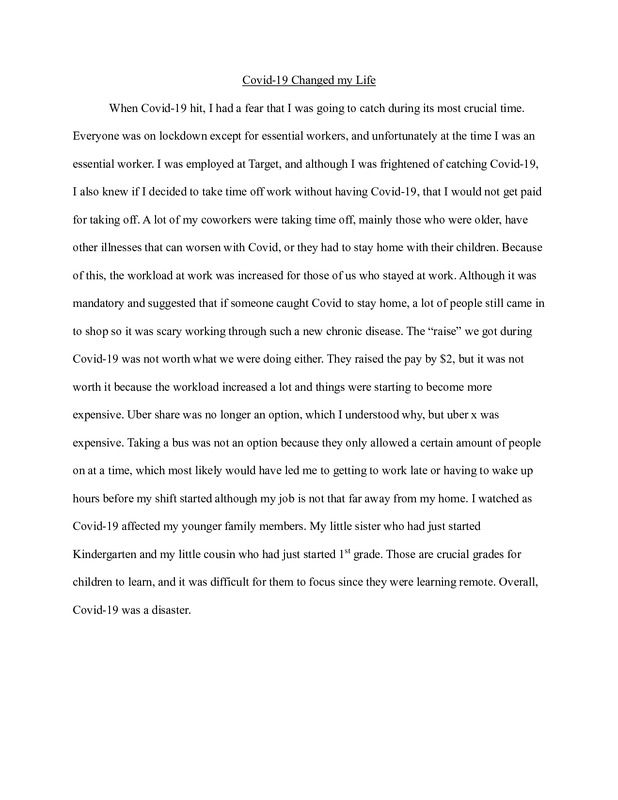 2019-09
2019-09Covid-19 Changed my Life
The item that I am a submitting is a short summary of my experience during Covid-19 -
2019-12
HIS 643-44605: Story on Tourism
Following the lift of COVID-19 restrictions, many people traveled for fun, adventure, or as a celebration of renewed freedom. However, I did not travel following the coronavirus and have never traveled outside the surrounding states. There are many reasons for this, but some of the primary reasons are that I am young, my parents never traveled, I have not had the money to travel, and the idea of traveling is scary. However, the older I get, the more I want to travel and not stay in the same space. There are so many places I want to travel when I can, that it is almost overwhelming. I want to travel to Italy, Greece, Sicily, France, Germany, Denmark, etc. I want to see David by Michelangelo, the Louvre, Santorini, Neuschwanstein Castle, Tivoli Gardens, etc. The sites I would want to visit are based on important historical and cultural sites. I would want to make the most of any place I visit, and I would spend every waking moment doing something. I would document my trip primarily through photos, videos, and physical evidence of my visits. I really enjoy collecting brochures, maps, stickers, post cards, etc., from places as a physical record of my trip. I hope to one day travel. -
2020-05-28
Covid 19- The First Wave
Schools were shut down, business were closing. My parents stood outside my living room waving as they dropped off Easter baskets for my children. The monotonous routine of my husband coming home from his shift as a police officer and bagging his uniform in a garbage bag in the garage so I could immediately wash them for fear he had brought home Covid. Two months passed of this until that dreadful day when neither of us could smell or taste anything. He had brought home Covid. At first, it felt just like a cold with the exception of the loss of taste and smell. But a few days into our positive results, my husband's symptoms became more severe. He began having trouble breathing at night. We had medicines and took precautions to get him through those nights. I was scared because we had two young children at home and they began to show signs of Covid as well. I didn't feel like I had anywhere to turn. In the beginning, you were told only to come to an ER if it was absolutely necessary and even then, the people who were checking into the hospitals were not checking out. It felt like a death trap to bring in my husband. Days passed and symptoms improved. We were lucky, it had passed. We had long-lasting effects when it came to rapid heart rates and regaining our taste and smell, but feel very lucky we eventually recovered. -
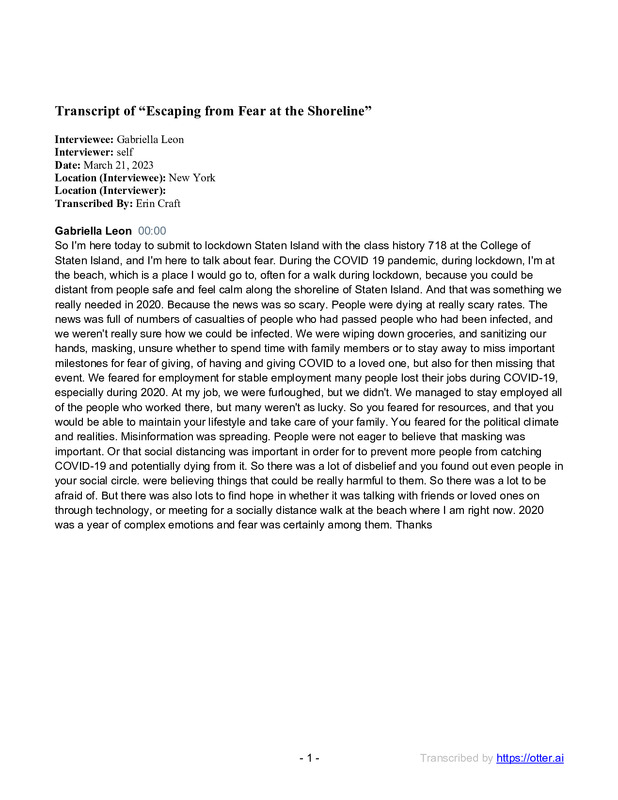 2023-03-21
2023-03-21Escaping from Fear at the Shoreline
Submission for #LockdownStatenIsland exploring Fear and the complexity of emotions during COVID Lockdown while at the beach - a place I visited often for a little peace and tranquility during that scary time. -
2020-03-06
The Two Week Break
My Junior year at Midwood High School took an expected turn as a national emergency was declared on March 13, 2020. I remember watching the news with my mother, excited to see I would have two weeks off from school. My mother and I would both be home as all non-essential businesses moved to remote or closed down indefinitely. I immediately messaged my friends about the two week break, planning to play video games all day long. We spent those two weeks staying up late as if it was an extended spring break. Little did I know that those two weeks would turn into months of isolation, living in fear of going into the outside world. I feared for my father as he was a registered nurse at Woodhull Hospital. Not only did he have to go outside everyday for work, but he would be face to face with patients, many sick and dying from this new virus that took the world by surprise. There was no vaccine for almost an entire year, so all he could rely on were masks, gloves, face shields and hair nets. My father and many other medical workers were needed overtime to deal with the immense amount of patients coming in everyday. As he came home from work my mother would bring his clothes and leave them by our front door. I worried for him at work as I feared he could get this virus that we were still learning about. Thankfully he never got sick with Covid-19 during the early pandemic, and with the new vaccines in development many of our fears were put to rest. After almost two months of not having any classes we were introduced to remote learning through zoom and google classroom. It was a very new experience for my fellow classmates and I, but it was nice not having to leave your bed to go to class for a while. However that relief of not waking up early to go to class turned into yearning to go to school and seeing my friends. Waking up every morning to see a screen filled with blank profile pictures with names made me feel very lonesome. I would never imagine missing going to school, but it was something that I had taken for granted. In my senior year of high school there was the option for hybrid learning which I was very excited about, but I'd later find out that there would only be rows of desks set up in my school gyms we used for physical education. It wouldn't be the everyday schedule of switching classes and seeing my friends in the hallways and library. I ended up doing another year of remote learning which was very draining but I managed to do well in all my classes with nothing else to do. Unfortunately I did not have a prom or senior trip, but I was very lucky to have an in person graduation and see all of the people I once saw everyday again. This story of the pandemic is very significant to me as it taught me to never take things for granted as everything can change in a moments notice. The things I'd known as my everyday routine of school and hanging out became a distant memory for a long time until numbers and fears of the virus fell. Being able to go to campus now and have a regular life again is something I will now cherish forever. It is still somewhat hard to socialize again after being isolated for so long, but I have made some friends along the way and I look forward to all the memories that await me in the future. -
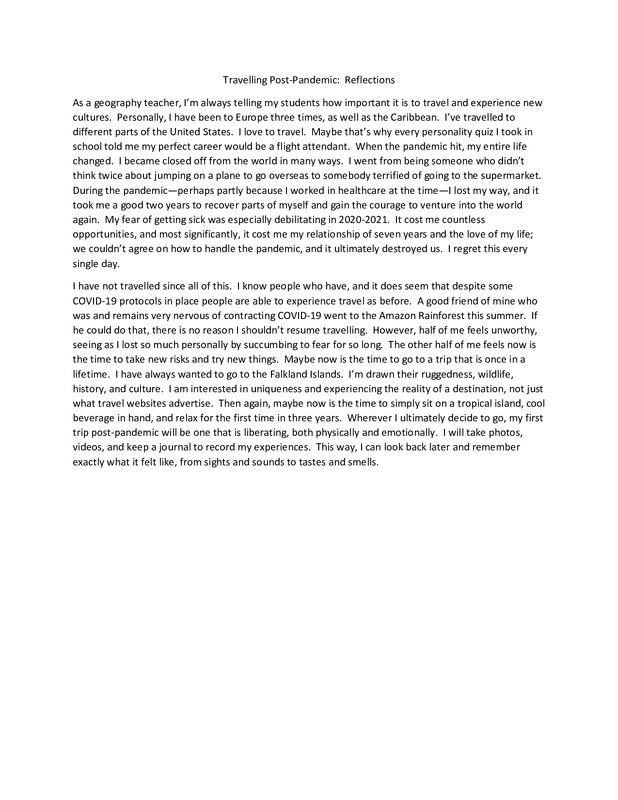 2023-01-29
2023-01-29Travelling Post-Pandemic: Reflections
Deciding whether or not to travel post-pandemic has been weighing on me emotionally. Here, I identify reasons I should vs should not travel, as well as where I would go and why. -
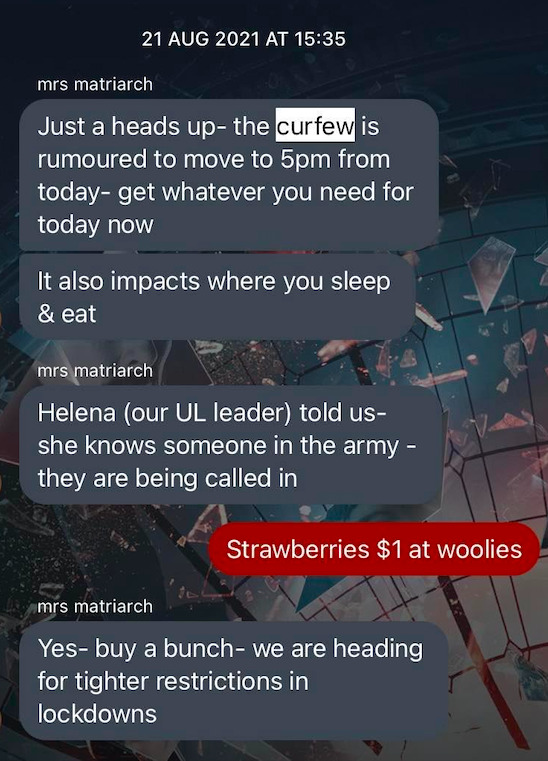 2021-08-21
2021-08-21HIST30060: Family Texts
This is a screenshot of a family text conversation in August 2021. The mother, nicknamed “mrs matriarch” on the Facebook Messenger application, is relaying rumours of an intensification of the lockdown restrictions, including the involvement of the military. She also encourages the popular practice of hoarding or panic buying. This conversation encapsulates popular anxiety around the suddenness of government responses to the pandemic. The user alerts their family based on a rumour that the 8pm Victorian curfew would be moved earlier to 5pm. In hindsight, the 5pm curfew never eventuated. Instead, the 8pm curfew became 9pm, before it was later removed. The user’s fear that the military would be involved further shows the anxiety felt by Victorian residents and the sense of entrapment. The conversation also indicates the popular phenomenon of panic buying and hoarding. The text reads, “get whatever you need for today now” and “buy a bunch – we are heading for tighter restrictions in lockdowns,” even for a perishable item like strawberries. Rumours had a very real effect on the population, prompting atypical economic behaviours, including the infamous toilet paper hoarding. The low price of strawberries reported by the user also illustrates the strange supply and demand for groceries during the pandemic and excess of fruit that year. -
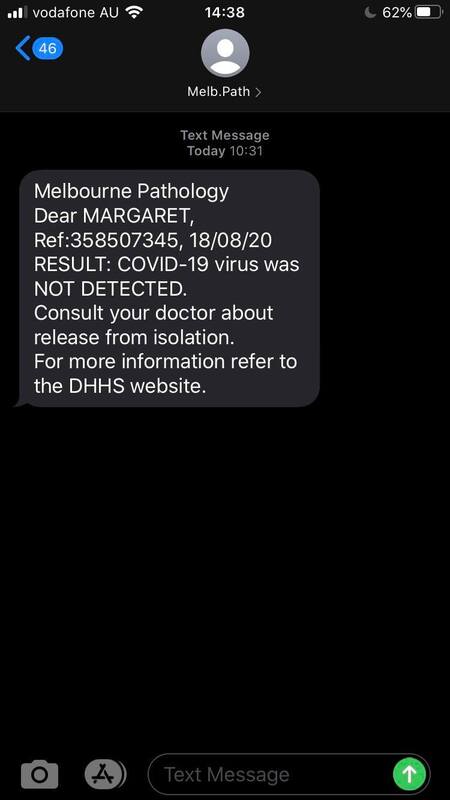 2020-08-18
2020-08-18HIST30060: Negative Test Result
This is a screenshot of a negative PCR test result from August 2020. At this time, test results would typically take 24 hours to process, with the government requiring that the patient isolate until they received the result of their test. I, like most residents in Melbourne, suffered a profound emotional impact from the bombardment of public messaging about the pandemic. The advertising campaigns by the state government as well as opinions expressed on social media suggested that a failure to follow health protocols would result in tremendous negative effects. For example, failing to get tested could be the reason that someone's grandmother died from exposure to the pandemic. With such high stakes attached to my everyday behaviour and compliance to health orders, whenever I felt even slightly unwell, it would trigger a barrage of intense anxiety. The health order to self-isolate for a week after a positive test result, as well as the Andrews governments' policy of reopening contingent on the number of positive test results in the community, further increased anxiety around any form of cold symptoms. To the day, this image evokes feelings of fear and relief. Something so mundane as a text message represented either a ticket to freedom or a binding health order. In this case, the text message represented a reassurance that my sickness was the regular, boring sort, and that I was not an accidental killer of grandmothers. It represents the use of everyday technology, both sophisticated and mundane, in the pandemic response. -
2022-06-26
Flying with Disease
Flying home from a tournament, where my team suffered defeat after defeat, I was not aware of much outside of my muscle aches, my mental and emotional exhaustion, and the bitter taste of failure in my mouth. The first twenty minutes of the flight was uneventful, just the occasional cry of a child, the subtle rock of the plane in turbulence, the dim light by which I read my book. Soon, as the turbulence died down, and the child fell asleep in the arms of its mother, every single person on the plane became distinctly aware of the continuous coughing of a lady wearing her mask. I had forgotten to grab one for the flight home, despite every intention of wearing one, and nobody else on the flight had one. Conversations noticeably died down as the coughing continued, and even seemed to get more frequent and intense. I put down my book, donned my headphones, and tried to watch a movie to drown out the noise. People shot furtive glances at the lady in question, all of us wondering from the sound of her cough, if she had Covid. The more I heard it, the angrier I felt, and the more afraid I got. I am an athlete and young, so would likely be fine if I caught Covid. However, my girlfriend and little sister are both high risk, and I did not want to risk exposing them. I managed to calm myself as to not make a scene, worthless at this point tens of thousands of feet in the air. I could not know the situation of the lady, whether she had a choice to be on this flight, or had to return home, attend a funeral, or whatever other reasons she may have had to go on a flight, sick, while there was a global pandemic. All I can tell you is that from the sounds of uncomfortable shifting in seats, the murmurs pointed at the lady, and the otherwise silence of the formerly talkative plane, nobody felt entirely safe or comfortable. I ended up catching Covid-19, and unknowingly giving it to my girlfriend who I live with. Despite having to take her to the hospital briefly, we both ended up fine. Whether our cases of Covid were from the lady on the plane or somebody else, I will never know. But the sound of incessant coughing during this pandemic still has the same effect wherever I go, creating a perceptible unease. -
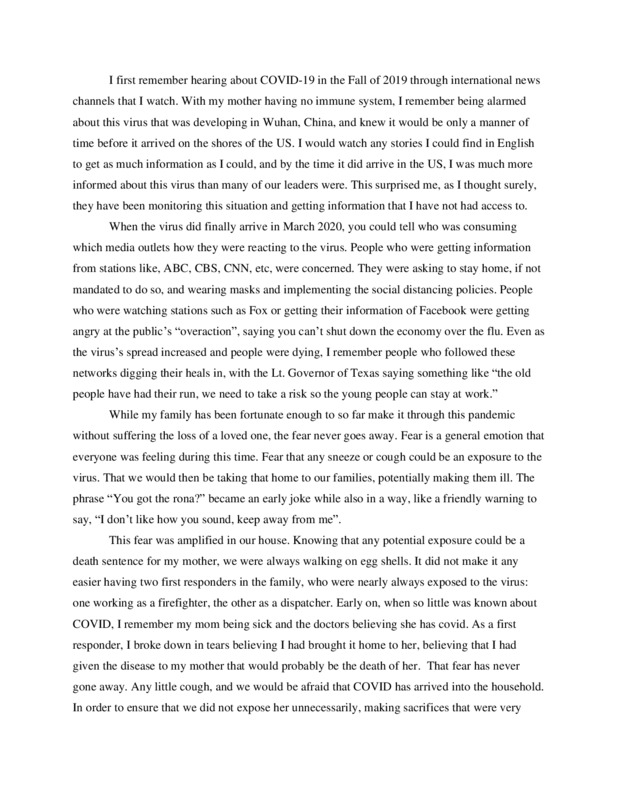 2022-07-24
2022-07-24Fear for My Mother's Saefty
I've written a short story centered around my experience with fear of this virus, particularly focusing on how my fear is heighten with an immuno-compromised mother. I wrote about how the media the people around me consumed affected their behavior and played a role within my fear and the impact it had on my mother. This story says two things about this pandemic I think: it shows the impact that information had/has on how people approach the virus and the emotional toll the pandemic had on people living their daily lives. What I've submitted is important because it validates what Americans have experienced. Many Americans -
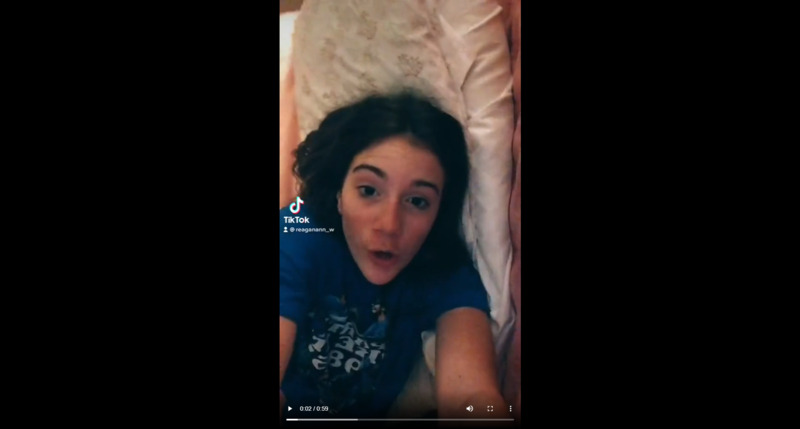 2020-03-12
2020-03-12Little Did We Know
This is a Tik Tok video from my sister’s account of her documenting the day we were sent home from school. In the video, she’s telling her viewers that school has been cancelled for three weeks, due to the rise in COVID-19 cases across the globe. This video says a lot about the pandemic, because personally I felt that the closing of schools and businesses for the sake of quarantine was a really defining moment of the pandemic. There haven’t been many moments/ pandemics in history that have provoked the closing of institutions, so the fact that this happened says a lot about the magnitude of the situation. This personal account also says a lot about the pandemic, because similarly to my sister in the video, at the beginning of COVID-19 many people were scared and unaware of how long this pandemic would ensue. I feel this video captures her reaction very well. -
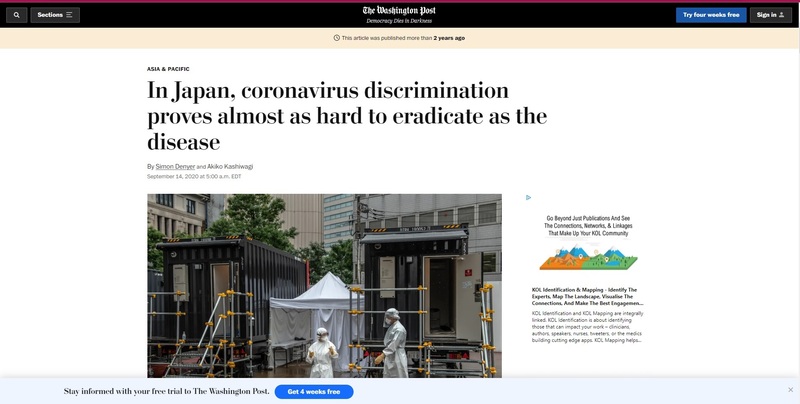 2022-05-16
2022-05-16Stigma During the COVID-19 Pandemic in Japan
During the COVID-19 pandemic, healthcare workers and patients in Japan suffered from the stigma. According to the article, “In Japan, coronavirus discrimination proves almost as hard to eradicate as the disease,” healthcare workers and their families are discriminated against as if they are “germs” that people need to avoid contact with. The patients of the virus are also stigmatized, and such a phenomenon of blaming victims has been seen many times throughout Japanese history. As this article represents, health care workers in Japan were stigmatized and discriminate against because of the potential risks of COVID-19 infections. According to Goffman, the greek definition of stigma “[refers] to bodily signs designed to expose something unusual and bad about the moral status of the signifier” (131). Nowadays, its definition has expanded to negative images of physical and social attributes and their interpretation in a social context. The stigma of healthcare workers in Japan is peculiar to this pandemic, and this could be because the situation overturned the expectations people had about healthcare workers. Healthcare workers are supposed to help people with diseases, but because of the pandemic, they are seen as the ones with higher risks of carrying the virus as they have more interaction with those who have been infected. As a result, people become afraid of interacting with healthcare workers, which made this job stigmatized. The article shows that Japanese people reject to interact with healthcare workers and their families during the pandemic. One of the common consequences of being stigmatized is that stigmatized people become separated from other people as they are treated differently. According to Goffman, “[the] responses of the normal and of the stigmatized that have been considered so far are ones which can occur over protracted periods of time and in isolation from current contacts between normals and stigmatized" (135). As Goffman illustrates, health care workers were stigmatized and separated from society at the beginning of the pandemic. Some people even believe that “the person with a stigma is not quite human” as Goffman states, which lead to an extreme reaction by people around health care workers. For instance, healthcare workers have been receiving death threats because other people see them as if they are the potential source of the disease rather than the same humans who are fighting the pandemic together. Such a reaction is similar to how children bully other children based on differences in attributes. One of the typical ways of bullying is to call someone “germs” and avoid interactions, which is the same as the situation in this article. This pandemic revealed our natural tendency of staying away from others who have negative attributes, which indicates that a pandemic is not an equalizer but a source of discrimination. Another factor that could have contributed to the situation in Japan is social pressure existing in the country. The article mentions that there is strong social pressure in Japan to follow coronavirus directives and to cooperate for stopping the spreading of the virus; if people do not comply, they are strongly criticized or blamed by other Japanese people. In addition, surveys have shown that compared to Americans or Britons, more Japanese people agree with the idea that “If someone is infected with the coronavirus, I think it is their fault” (Denyer and Kashiwagi). According to Fei, there are behavioral norms that are maintained by tradition, called “ritual norms” (97). This kind of norm is regarded as moral behavior by people of the community so that they follow the norms regardless of laws or punishments (99). Although Fei discusses Chinese rural society, such norms have been established in Japan as well because Japanese society developed as an agricultural society where people in a community need to cooperate with each other. There used to be a tradition called murahachibu, which means excluding those who break the rules from 80 percent of social activities in the village with the exception of funerals and fires. Even though this practice is rarely seen in modern society, people still have a strong pressure to behave for the sake of society in order to maintain harmony. For example, Japanese people still feel obligated to wear masks after vaccines have been promoted even though there is no rule or punishment for not wearing masks. This feeling may occur because they believe it is moral or correct to refrain from doing something that possibly spreads the virus. Healthcare workers were not the only people who suffered from stigma, but COVID-19 patients were also blamed for their behavior that possibly contributed to their infection. In the article, a Japanese psychology professor mentions “a low tolerance for uncertainty” in Japanese people, indicating that they blame the patients to reduce their own fears derived from the uncertainty of the pandemic. This implies that COVID-19 patients become scapegoats for the pandemic itself. In the reading, Trauner writes that “the general acceptance of the germ theory in the 1880’s did little to dispel the popular belief that epidemic outbreaks were directly attributable to conditions within Chinatown” (73). This indicates that when people are uncertain about something scary, they try to identify what or who causes that disease or threat. Although people know that coronavirus is the cause of this pandemic, most people are afraid of germs and viruses because they are invisible. The article also demonstrates some cases of blaming victims in Japanese history, including leprosy patients, survivors of the 1945 atomic bombings, and evacuees of the 2011 Fukushima disaster. Such diseases and disasters involve complicated factors, so it is difficult to blame the causes directly. Therefore, individuals tend to blame patients or carriers of the virus during the pandemic instead of blaming the virus itself because they are visible and easy to avoid. References Erving Goffman (1976) “Stigma” :Chapter 10 “Selections from Stigma” Fei Xiaotong (1947) “From the Soil: the Foundations of Chinese Society” Joan B. Trauner, (1978) “The Chinese as Medical Scapegoats in San Francisco, 1870-1905 Simon Denyer and Akiko Kashiwagi (2020) “In Japan, coronavirus discrimination proves almost as hard to eradicate as the disease” -
2020-06-04
Reality Check
When the pandemic began about two years ago, I vividly remember thinking, "Okay, this should not last very long." But I was completely wrong. The pandemic took a lot of things from society, the ability to operate like we would normally would and instilled a fear that many of us had never experience. In my situation, it took the opportunity to have a traditional freshman college experience. Although, it allowed me to have classes on-line and have flexibility in my schedule, it took the one- in a lifetime experience of going from high school to post-secondary education and experiencing all that goes with that transition. This was a dream for me to accomplish, attending a recognized institution and having that ability to dorm, make friends, experience the college life. However, this pandemic made that possibility very surreal. This pandemic in a way was a reality check for me. Never once did I ever think that this type of situation would happen, you heard about it but you always thought about this like if it were something in the past. -
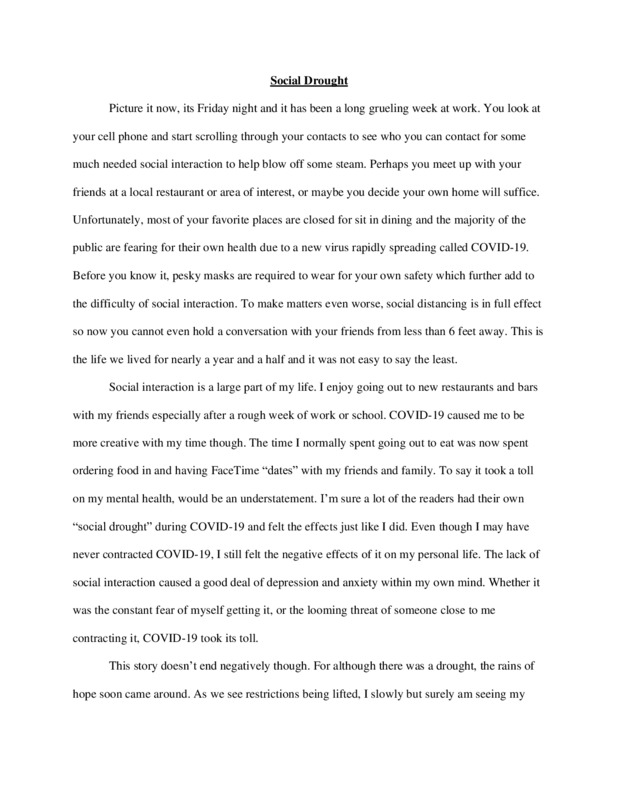 2022-04-29
2022-04-29Social Drought
Social Drought is a text story about how the pandemic erased all hopes of maintaining an active social life and how I had to find ways to fulfill my need for social interaction. -
2022-04-29
How Covid- 19 has impacted my life
On the 11th of March 2020, COVID 19 was declared a global pandemic. With such an explosive magnitude and wide reach, the world braced for its impact. Lockdowns were set in place in every country, travel was shut down, and grocery stores were often out of many essential items. Many have lost their jobs or sources of income, Many of us have battled this virus and lost loved ones to it. For better or worse COVID 19 has changed us permanently. The impact of COVID-19 is observed in every sector around the world. It has affected education systems worldwide. After attending classes in person for the majority of my life the transition to being a full-time student online was not a simple adjustment. I encountered feelings of anxiety about my classes and was overwhelmed by having to move back home from the dorms. Thankfully the support from my family was encouraging. Being an online student has taught me more about time management than anything else and procrastination became a close friend. Missing out on class activities and gathering on campus have been discouraging. I felt as though I was missing out on the college experience and felt left out. It's important to remember while I am feeling these emotions so there are many more. Being able to connect with other people and share our experiences have opened up doors to new friendships. I would be lying if I said I did not have trouble going to sleep at night during these difficult times. Especially when I would constantly hear the news about how the elderly are more vulnerable to exposure to the virus. The thought of losing a family member is terrifying. Before the pandemic, I would often visit my family who lives in Mexico once a year during the summer, but traveling was no longer an option, the risk was too high. As times have passed I am more comfortable traveling and being able to see loved ones. Similar to schools, churches also went online. Before COVID I was really involved with the staff team at my local church. I constantly helped with volunteer activities, I helped in the kid's ministry, and I also helped with the church's coffee bar. With the transition online I lost the sense of community and fellowship. Many of the kids graduated out of the program online and it was difficult not to be able to celebrate in person. With every transition, I learned that adapting is the best form of survival, I cannot predict the future and I don't know what this year will unfold, but I will do my best to express gratitude for my health, and for my family’s health. -
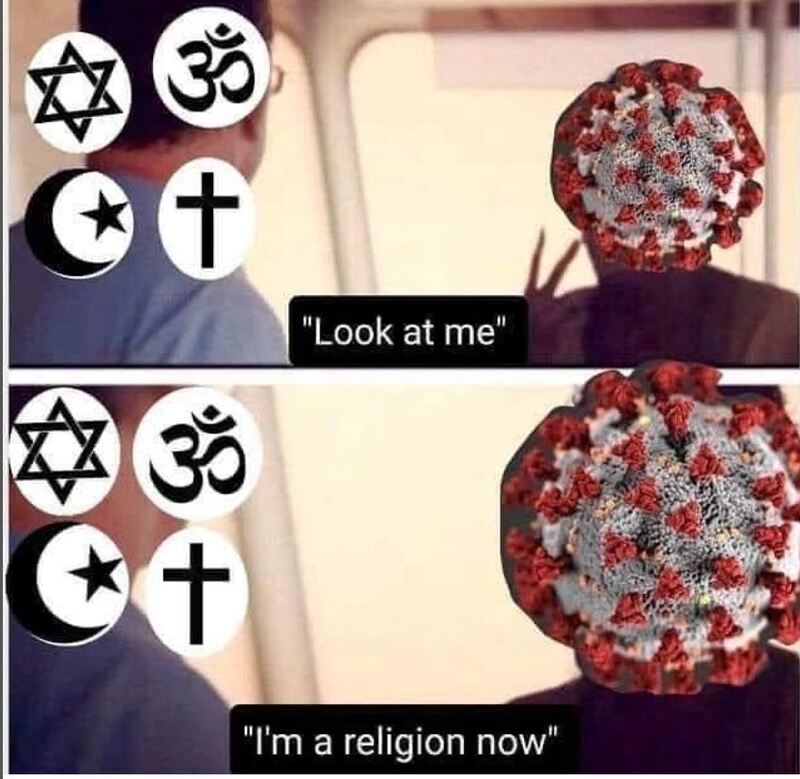 2021-09
2021-09Meme about covid-19 as a religion
I encountered this meme on twitter in 2021. Someone had shared it not understanding what it meant, to make fun of whom they assumed was an American Conservative who made it, and when I first saw it- it provided me with a lightbulb moment. I had not been able to understand through the pandemic why followers of God based religions were not able to take the pandemic seriously. Outside of conservative politics there was an aspect missing from the conversation about the pushback against pandemic safety measures. This meme showed me that many believers in God were unable to take the pandemic 'seriously' because to be afraid of covid-19 would be to view and interact with it like they do God. If you fear God, if your relationship to God is fear based, you cannot fear Covid-19 unless you wish to treat it in a manner similar to God. I think this simple meme is important in contextualizing the history of the pandemic, how those of God based faiths could not cope with the pandemic in a similar manner as others. The pandemic has changed me in a lot of ways, I had just turned 22 when the pandemic first started and now in December of 2022 I will turn 25 years old. Transitioning from early to mid 20's is always a challenge but the pandemic has created strange times as I transition more into adulthood. This meme has begun an interest and more mature perspective on the role religion plays not only in politics but the psychology behind people of God based faiths. This meme alone has assisted me in developing compassion for people I thought were just stupid when the pandemic started. There is no one rational response to immense fear, only personal widely varied responses; every person has a deeply individualized psychology built off of neural networks formed only by their unique experiences daily. -
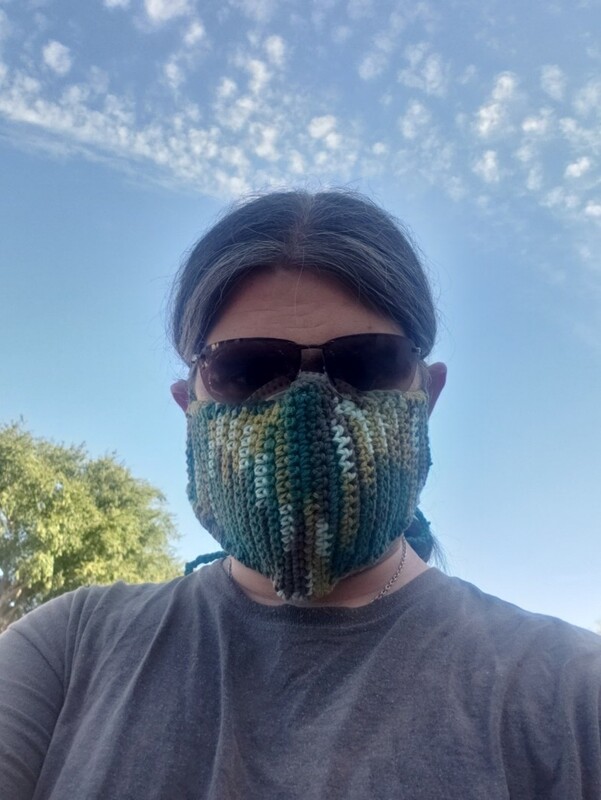 2022-04-01
2022-04-01Living Through the Pandemic
One thing that really stands out to me when I look back on the past two years since the pandemic began is how much fear there was at the onset. I remember it being about mid-March of 2020 and schools had moved to online learning, all nonessential businesses were closed, and it was almost impossible to find even basic groceries. The overwhelming majority of people were wearing some sort of face covering at this point and just the act of going outside felt dangerous. I should point out that since I work in the aerospace and defense manufacturing sector I was classified as an essential worker without the possibility of working remotely. Given that all of my friends had jobs that had moved to remote work and could isolate in their homes I felt that it was too risky to be around them given that I was out every day. I think that it is interesting that this was the state of affairs when there were maybe 1000 confirmed cases in the state of Arizona at this point. When contrasted with the reality that there have now been a total of over 2 million confirmed cases with approximately 25,000 currently active cases and for the most part everyone is going on with life as normal, I am left wondering if the fear at the beginning was irrational or if the current sense of complacency is the result of a society worn down to the point of indifference? -
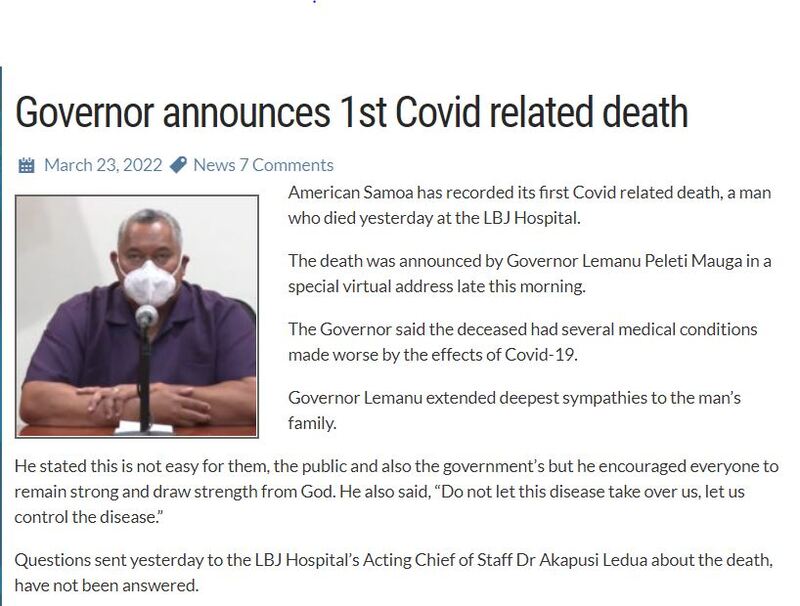 2022-03-23
2022-03-23First Covid Related Death in American Samoa
On March 23, 2022, American Samoa reported its first Covid Death. This article was released on Talanei News with the Governor sending his sincere condolences to the man's family. With the surging number of cases in American Samoa from 555 last month to 2000 plus recently, the Governor went live on the local news when the first covid related death was reported to express his sympathies and to the public never to lose hope and to keep fighting against the disease. After two years, American Samoa had just experienced its first covid related death, making everyone worried that more deaths would come. And sadly, I think there will be. I have seen how COVID deaths have increased globally for the past two years, and as much as I do not want to think about it, I know it will be bound to happen. And just like me, the American Samoa public worries that since it is a tiny island, COVID-related deaths will spread quickly. When I saw this article on Talanei News, I immediately began to worry. I felt like I also lost a family member thinking about my parents. Experiencing death is never easy, and COVID has brought a lot of sadness. This article gave me fear, worries, and sadness altogether. This is why this article is essential to me as it informed important information about home during the drastic times of COVID and death. -
2020-09-01
Seattle's 2020 summer, school, and kids
At the end of 2020, I was completing my student teaching online for my BA in Secondary Education. I was placed in a school in Seattle. Student teaching during this time is something that was incredibly difficult. Looking at faces through blurry webcams, and seeing the black tiles in zoom from students who wouldn't or couldn't turn on cameras. I will never know what a lot of the students looked like, or what their voices sounded like, but getting to read their work, and see their messages in emails and chats is something that I will always remember and will always hold a place in my heart. The 12-14-year-olds I was teaching had just been the last 3 1/2 months watching the BLM protests and marches in their city take place. A few students told us that they lived just streets away from the main events. Some students had been active in the BLM marches and protests that had taken place during the summer before, some stayed at home and watched on social media live streams and the news, some had parents who were heavily involved. They watched their friends, their family, their community, and strangers get tear-gassed, hit with "blast balls", and be subject to other physical violence. The levels at which they understood the what and why varied. Some had such an amazing level of nuance that some adults I knew couldn't comprehend. Others had an extremely base understanding of why people were protesting and marching. But all understood that it was a monumental event and would be something remembered in history. These children were scared, concerned, confused for a variety of reasons. Yet, overwhelmingly there was a sense of urgency for justice from these kids. My lead teacher and I knew that we had to pivot lessons in order to keep them engaged and meet their needs. Focusing on how the concepts they needed to learn could be applied to material that would interest them, and using homeroom activities to try to calm nerves, create a sense of community and answer questions about everything from Covid, to the protests, to the current election. They wanted to write and read about what was important to them, what they saw around them, and they wanted to read about different perspectives and lives from their own. We honored that. For the final writing assignment of the semester, we gave them some guidelines and standards that needed to be met within their writing, but gave them some freedom on how they wanted to meet those standards. I won't get into the specifics of the assignment, but I will say it worked well and was adapted to best serve students at all levels, and those with IEP/504 plans. We were met with everything from songs and poetry, letters to the mayor and the governor, essays about our anchor text, to reports about youth activists that they researched. I don't think the impact of the events of summer 2020 in Seattle on children is thought about. The events that a child experiences and is around affects them for the rest of their lives. Most don't have the skills yet to emotionally process fully what they see. Their thinking didn't stop when the marches and protests did, they wanted to learn and talk about it in order to process. The compounding factors of the summer and prior to that Seattle was essentially ground zero for Covid in the U.S. left most kids spinning. School became a safe place for a lot of these kids, and I hope that it has continued to be one. -
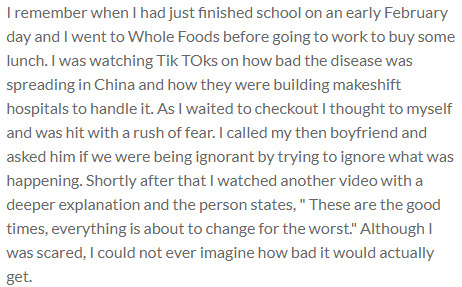 2020-02-01
2020-02-01Ioana Juravlea's Experience
I remember when I had just finished school on an early February day and I went to Whole Foods before going to work to buy some lunch. I was watching Tik TOks on how bad the disease was spreading in China and how they were building makeshift hospitals to handle it. As I waited to checkout I thought to myself and was hit with a rush of fear. I called my then boyfriend and asked him if we were being ignorant by trying to ignore what was happening. Shortly after that I watched another video with a deeper explanation and the person states, " These are the good times, everything is about to change for the worst." Although I was scared, I could not ever imagine how bad it would actually get. -
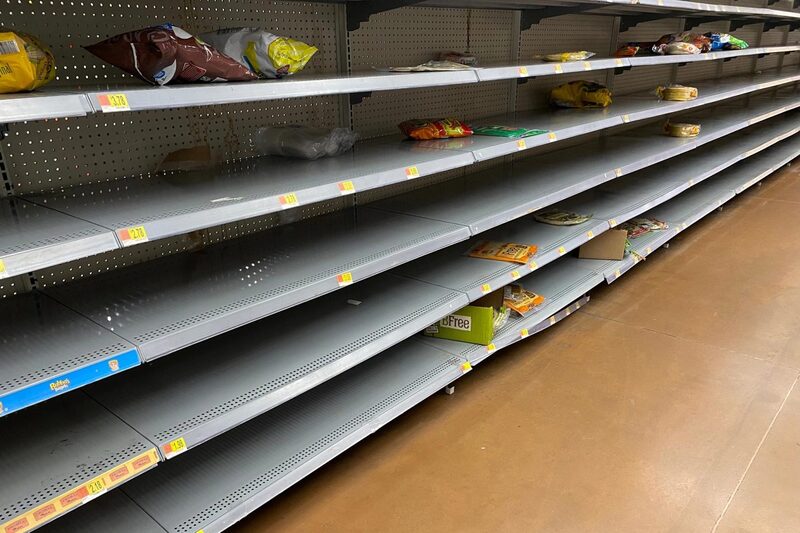 2020-03
2020-03empty shelves
My plaque story begins in March 2020, right in the middle of my senior year of my senior year of high school. that day we were let out of school for, what we were told, 2 weeks. One of my friends was away at a baseball camp that night and he had left his car in our school parking lot so me and my friends decided to go to the grocery store, buy a bunch of Saran Wrap, and Saran Wrap his car. At this point the amount that the pandemic would affect our lives hadn't sank in yet but when we got to the grocery store to buy the wrap we saw a very surreal sight. Hundreds of people were there wearing masks and gloves, and even goggles. People were buying canned food and toilet paper in mass quantities and there were numerous empty shelves. It looked like something out of a movie and that's when it began to sink in how crazy the situation was. that same week I remember going hiking with a couple of my friends and talking about the pandemic. I remember us wondering if anyone that we knew would end up getting the virus or if it would fizzle out before it hit Pennsylvania and if or when we would go back to school to finish our senior year. It turned out that we would never go back and "two weeks to slow the spread" turned into months and then years. It is now February 2022 and our lives are still being turned upside down by this pandemic. All we can do now is hope that things eventually return to normal and that we as humans can learn from the mistakes made during this pandemic. -
 2020-03
2020-03Dealing with my anxiety
As most young adults my age, I suffer from severe anxiety. Dealing with anxiety daily, can be very challenging at times, especially during a pandemic. I have been fighting a battle with anxiety most of my life. At this point, I am really used to the extra thoughts in my head. I have learned to help manage it, but not completely get rid of it. I believe that anxiety has made me who I am, in a way, because I do not remember a time where I was not struggling. In 2020, a pandemic instantly flooded the world. This completely impacted my entire life. I was not able to experience my last year in high school, I was not able to be around the one person that helped me with my anxiety, etc. I was forced to wear a mask that I could barely breathe in. I lost touch with most of my friends that I developed over my lifetime. This instant wave of depression suddenly hit me. I was so nervous on what would happen next, and how long will this last. People were dying from this pandemic. I constantly worried about if the sickness would hurt one of my family members or someone important to me. Over the time of being in quarantine, I thought to myself ways on how I could relax and not worry so much about the pandemic. I told myself every day, “Everything happens for a reason”. This is what I truly believe and for some reason it really does calm me down. I am Catholic. I am a very deep believer in God. To me, trusting in the Lord is the best anxiety reliever around. Covid-19 is still around today. Without Covid-19, I would not be where I am today. Although this pandemic has an abundance of negative impacts on my life, it also had some positive ones, too. I would not have attended Duquesne University, met so many amazing people, and made a plethora of memories that I would not trade in for. I believe talking about my anxiety, especially during the pandemic, is very critical because I am not the only one who is suffering, too. Everyone is nervous about what is going to happen next. To me, this is HUGE on helping me with my anxiety. I can finally think to myself that I am not alone. I believe that people who suffer from anxiety, especially from the pandemic started in 2020, can have a place to go if they are nervous. When I was struggling, I felt alone, and I was the only person who felt this way. My story will allow people to realize that they are not alone. Everyone is dealing with this stress and anxiety that I suffered from. My story tells people that I have worries and doubts, too. The pandemic not only had negative impacts, but they also had positive impacts. Focusing on the positives, will distract you from the anxiety and worrying. My story should help prove that. My story should allow people to see and find new ways to cope with the stress. I hope my story leaves a positive impact on people who did or are struggling. Everyone is in this together, and nobody will be alone in this major impact on the world. -
2022-02-06
A never ending battle on COVID-19
It’s been nearly two years since the start of the pandemic, and if you ask some people, the state of this disaster hasn’t improved a whole lot. I turned 20 a few days ago, which marks my second birthday that has passed since the official start of Covid, which if I’m remembering correctly was March 13th, 2020. I’ll never forget the announcement made over the Pine Richland High School loudspeakers that day. Sitting in the back of the statistics classroom, the statement told us that we would have no school for the next two weeks, which at the time beat any time off we’d ever had prior. Fast forward two years later and we still wear masks indoors. We still have to wash or sanitize our hands after just about any surface we touch to hope we don’t get the virus. Even more importantly, I haven’t been able to see some of my family for years now. Driving all the way out to New York would be risky since they aren’t in the best health, and it’s not worth taking any chances with how bad this virus can be for some people. The worst part of it all has to be that we don’t know when this is going to end. It’s been long enough that the pandemic has become political, with rivalries between those who choose and refuse to get the vaccine, but will it ever stop? Will there ever be a point in time that we can all feel safe enough to be able to do anything without living in fear of this virus? I never expected to be sitting here years after this all started writing how just about anything is still affected by Covid, but I guess I’ve gotten used to it. After all of this, though, the whole “you never know what you got until it’s gone” saying really does remain true. -
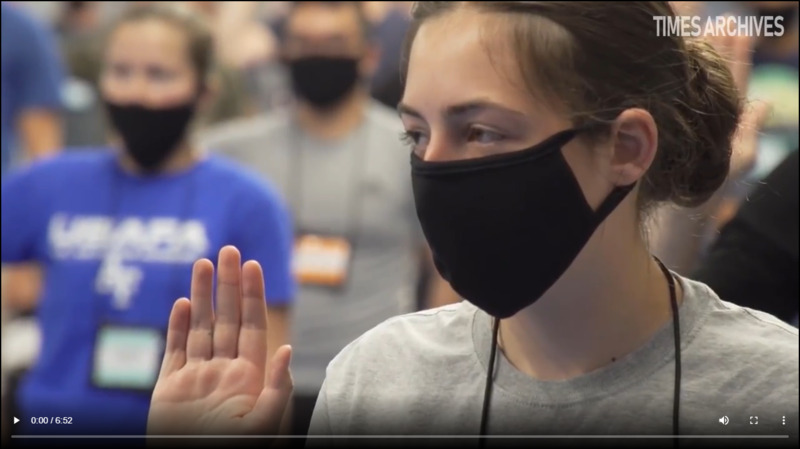 2020-06-25
2020-06-25In-Processing Day for the Class of 2024 at the United States Air Force Academy
Imagine yourself going into your senior year of college... but at a service academy while COVID-19 has sunken its teeth into every aspect of our lives. While most colleges and universities around the globe pushed back the start dates of their fall semesters in 2020 or moved entirely online, Service academies in the U.S. needed to meet congress' demand of supplying a steady stream of future commissioned lieutenants to the military. As a result, I found myself at 23 years old as a flight commander of 30 young, recent high school graduates who needed the same level of indoctrination I received into the Air Force four years prior. Rather than videos of years past with cadet cadre in the faces of soon-to-be freshmen screaming at the top of their lungs, this video provides the innocuous version of in-processing with unedited or dubbed audio. You might even see a few of my basics who didn't know what to expect of basic training during the pandemic. While the cadre in the film stand professionally and talk with a sense of authority towards the basics, I can tell you behind the scenes we were re-writing COVID-19 protocol and adjusting their syllabi as each day passed. Your authority as a military instructor weakens as its filtered through a wet, uncomfortable cloth mask (I strongly encourage you to look up "I-Day" videos of USAFA prior to the pandemic to compare). Can you imagine how much you have to yell through one of those masks to get 30 individuals to hear you over the other 39 flights sprinkled across the campus drill pads? My 6 weeks as a flight commander were filled with frustration, sympathy, reward, and most of all focus. First, focusing visually, I had to maintain social distancing anywhere from when basics were wrapped around the hallways to wait to shower all the way to when they practiced marching non-military standard "double-arm interval" for their basic training graduation day. Also, focusing through sound, I had to understand my basics through sweat or dirt covered masks as they recited knowledge, asked questions during academic blocks, or were struggling and needed follow-up mentoring. The measurable distance between trainers and trainees as well as the pauses of silence, normally filled with a constant cacophony of yelling, are what many graduates of my alma mater would call weak. Despite a lack of intensity, masks added a layer of confusion and frustration during a period that is already filled with fear, stress, and exhaustion for basics. For that reason, I want to ask those who weren't there to understand sensually why the class of 2024 still went through the same basic training experience as years past. Maybe a second listen to the audio can even reveal those same frustrations and fears from the basics reflected in the tone of their cadre. -
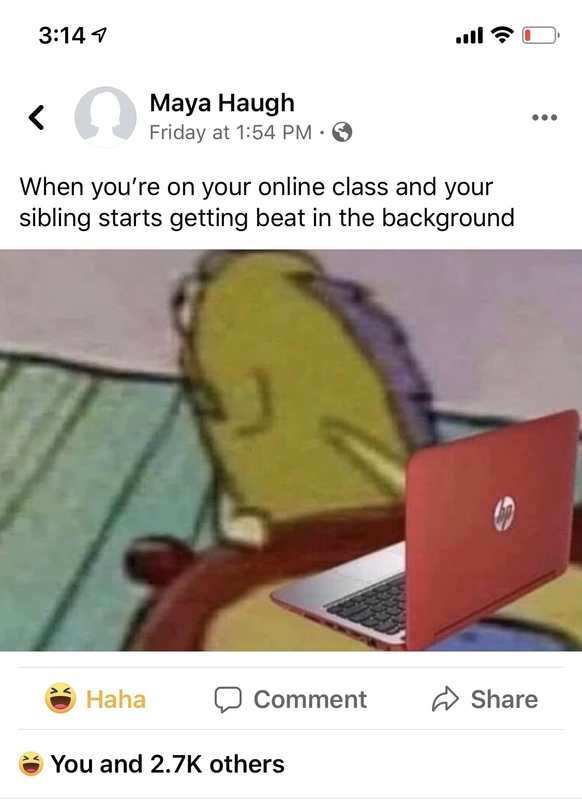 2021-12-21
2021-12-21My senior year in high school
The pandemic happened in my senior year of high school so it ruined my last year because I officially become a college student. I was really shocked knowing that I could never be in the classroom again. I wasn't expecting that because everybody thought it was going to be like a 2 weeks vacation for students. The challenge I was facing that is staying inside the house without stepping outside for 2 months. I drove me crazy because I like going on with friends and family, staying inside makes me feel like I've been locked up. And the fear of getting infected by Covid because you could put your family in danger. But as time goes, I get used to everything, I get to step outside after 2 months and I have to get used to wearing a mask in public which is not comfortable at all -
2020-04-29
Giving Birth During The Pandemic
My name is Niki, I'm 38 and live in Clovis CA. In March of 2020, I was about 8 and a half months pregnant with my son, Tate. I went to school part time, majoring in Early Childhood Development. I was also a stay at home Mom to my then 3 year old daughter, Quinn. She’s my driving force in school because she is on the autism spectrum. In March she was just beginning to talk and have real words,and her brother was coming, it was an exciting time. My husband Mike, is what they call an over the road trucker. Meaning he was gone all week and home for 30 hours over the weekend. The situation was not ideal for us, but it worked to give me the freedom to be with Quinn to take her to the therapies she needed. Then Covid came to the US. Everyone was forced inside. School shut down. The daycare closed. All therapies were put on hold. Everyone was told to wear a mask and sanitize everything. My baby shower was canceled too many people, myself included, were too scared to get together. Mike was not allowed to come home, in fear of being exposed or exposing us. He had to stay on the truck and keep delivering supplies. Then the hospital called and said I needed to prepare that the beds might fill up in the maternity wards with Covid cases and I might need to do a home birth. Could I find someone to assist me ? I had no one! We had only lived here for a year and I haven't made many friends. I had my Mom but she’s older, not able to deliver a baby and quarantined for her health. My sister lived kinda close but she was with her family and was quarantined like everyone else.I had my three-year-old who only had 4 real words !! Then the hospitals call and say “ Don’t worry you can give birth here, no one can be with you and we might take your baby from you right away and keep them from you for about two weeks to make sure they dont have Covid '' Um No ! Home birth sounds good right about now. I had the worst dreams up until my son’s birth. Thankfully, there were beds open in the maternity ward. Thankfully my husband's dispatch got him home just in time for Tate’s arrival. The hospitals allowed one support person in the room for the birth, so he was there. It was the scariest experience. I begged everyone to not take my baby. The hospital didn’t look like a hospital. Everything was covered in white plastic from ceiling to floors. Everyone had on masks and face coverings. It was a scene from a scifi movie.It was one of the scariest times of my life. Amidst all the chaos and stress my beautiful chunky completely healthy son made his entrance into this world on April 29th, 2020. We stayed in the hospital for two days and no one took him from me. I made sure of that. We went home and adjusted to life with a newborn and living with Covid like everyone else. Its been a year and a half and the hospitals have not changed the rules about only allowing one support person in the delivery room. I try to share as much information to expecting mothers as I can. There are no in and out privileges anymore.Once you are in the hospital, you have to stay there. You need to pack snacks! Or you can have food delivered to the hospital. Still can't have visitors. Have an extensive “go bag” ready for when it’s time to go. I hope with all the advances with the vaccine and lowering cases and people being more conscious of their health the hospitals will relax a little on the support team numbers for expecting moms soon. That’s my Covid19 share. -
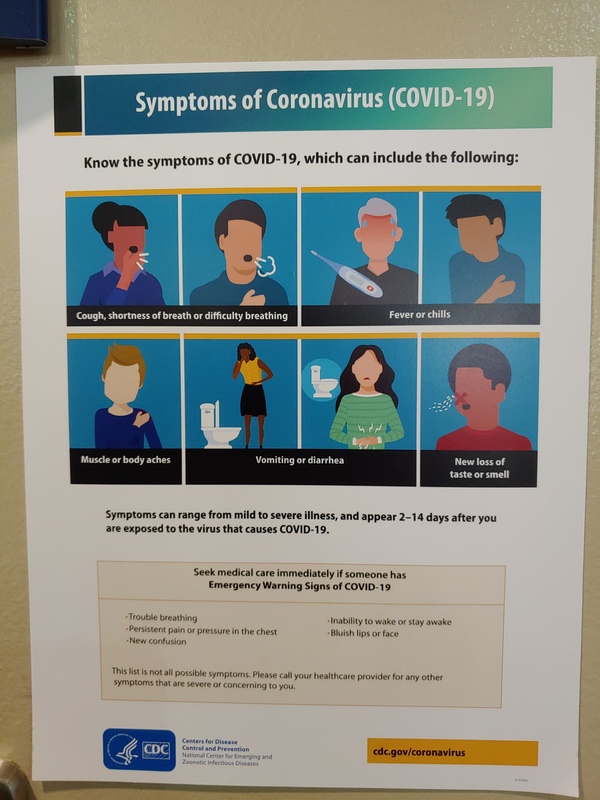 2021-11-29
2021-11-29Are you sick and experiencing COVID 19 symptoms?
The public was or maybe still is a lot more fearful of contracting COVID 19. If you were sick at you were advised to stay at home and work due to fear of contracting the virus. This image identifies some ways to know if you or someone may be infected with COVID 19. -
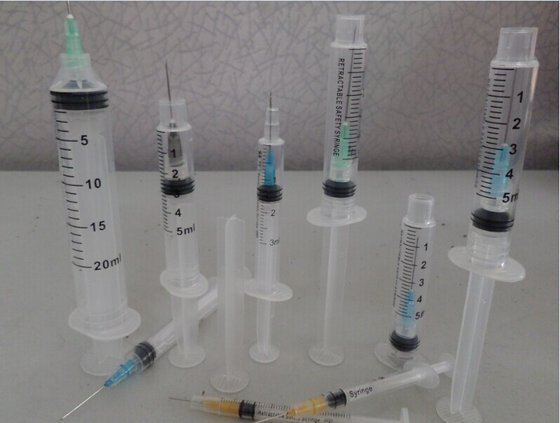 2021-11-29
2021-11-29Needle stick accommodations made available to the public
Not everyone is a fan of hypodermic needles ( personally I am not). Healthcare has made considerable accommodations for those who are available for vaccinations by changing the size of the needle gauge; child and adult. By the healthcare industry developing new, different, and special accommodations for providing vaccinations via needle sticks are taking into consideration not everyone likes needles. For the most the public have a fear of needles. To now make the vaccinations a lot more welcoming for you as child /adult have options. There are now even needle-less "sticks" -
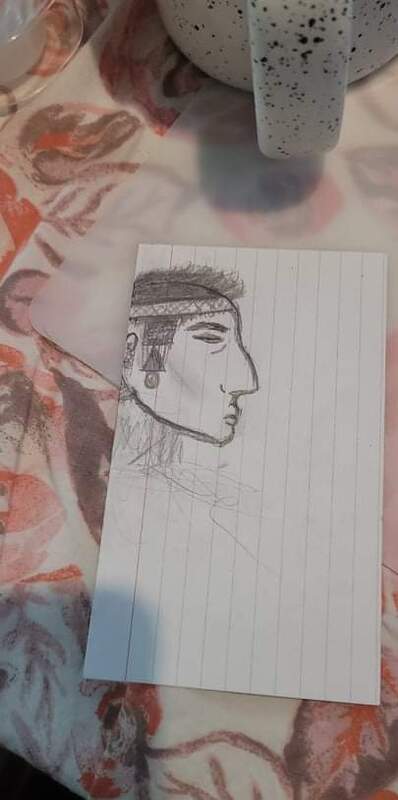 2020-03
2020-03Being Indigenous During COVID-19
I am a Game Art major at Full Sail University, but my sister goes to Northeastern University, so we are a Northeastern family. I am of Mayan descent, so living through COVID-19 was a little scary because we got all the news and updates about how COVID-19 was ravaging Mayan communities in Guatemala. We live in the USA in a rural area, so we were a little "safer," but the fear remained. I am proud of my people and my heritage, and I don't doubt our ability to survive the pandemic. Here is a quick sketch I made. -
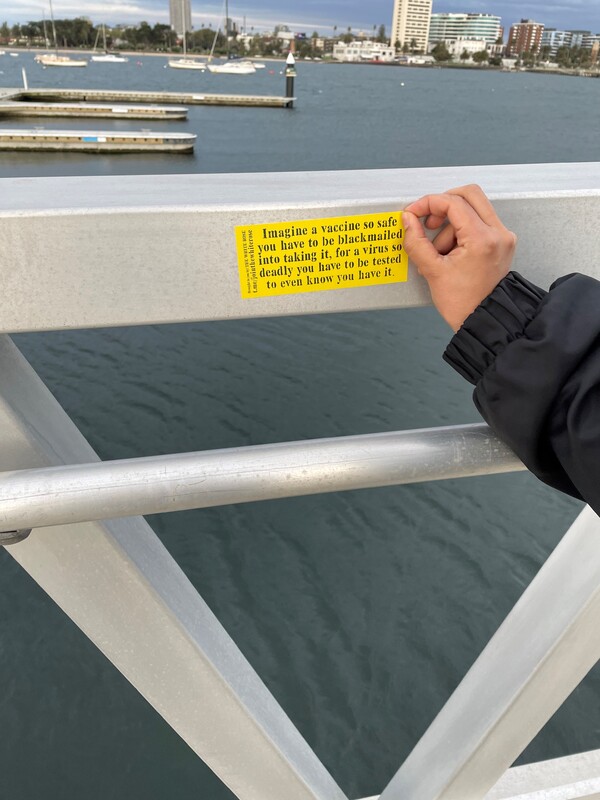 2021-09-19
2021-09-19HIST30060 Misinformation
This image I took down the St. Kilda pier. Someone had left various stickers that spread misinformation about covid, lockdowns and the vaccine. My friends and I decided it was best to remove these stickers as they are quite harmful. Living in Melbourne it has been so tiring watching ‘freedom protestors’ and people from far-right groups constantly spread misinformation and attend protests during stage 4 lockdowns (where we can only leave the house for the essentials). The fear-mongering these groups do its quite upsetting as I’ve seen my friends and some distant family members share their information on social media. The ‘anti-vaxxers’ and covid deniers even compare wearing a mask, getting vaccinated and being in lockdown to the Holocaust, which is so harmful and upsetting -
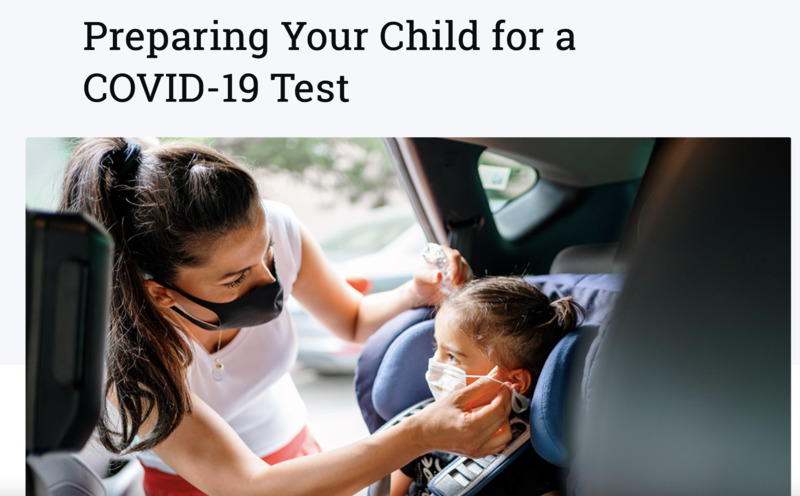 2020-07-28
2020-07-28Preparing Your Child for a COVID-19 Test
A blog post from Banner Health about helping children take a Covid-19 test -
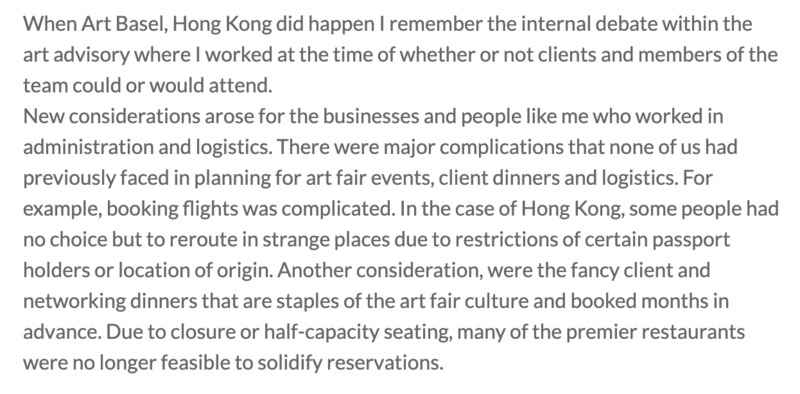 2021-05
2021-05Financial vs. Public Health In Planning for Art Fairs
When Art Basel, Hong Kong did happen I remember the internal debate within the art advisory where I worked at the time of whether or not clients and members of the team could or would attend. New considerations arose for the businesses and people like me who worked in administration and logistics. There were major complications that none of us had previously faced in planning for art fair events, client dinners and logistics. For example, booking flights was complicated. In the case of Hong Kong, some people had no choice but to reroute in strange places due to restrictions of certain passport holders or location of origin. Another consideration, were the fancy client and networking dinners that are staples of the art fair culture and booked months in advance. Due to closure or half-capacity seating, many of the premier restaurants were no longer feasible to solidify reservations. -
 2021-09-21
2021-09-21HIST30060 Footage of smoke on the Westgate Bridge during anti-lockdown protests in Melbourne
This video was taken on 21 September 2021, capturing the view of the Westgate Bridge from Williamstown, Melbourne, as anti-lockdown protestors fill several lanes and disrupt traffic. The footage shows smoke coming from the bridge and all traffic brought to a standstill. There were also helicopters hovering and police car lights joining the scene later on. I was on a walk with a friend along the Esplanade at the time this footage was taken. It felt quite scary to be seeing aggressive, violent attitudes manifest so close to home. We knew what was going because of news updates coming through our phones. After the initial shock and fear at witnessing this happening on a few kilometres away, my friend and I walked the rest of the way in silence, too appalled by the behaviour to do more than shake our heads in dismay. -
2020-03-16
From Unheard of to Unheard
This excerpt outlines how the start of the pandemic affected the noise level of an undergraduate college campus. -
2020-03-29
Eau de Sanitizer: A Home Fragrance
The early days of quarantine were quiet and calm, as the streets around my home in Southern California were filled with silence since there were fewer cars and people roaming outdoors. Sanitizer and rubbing alcohol were in high demand, and in heavy rotation in our home, as everything that came in was wiped, sprayed, and cleaned before being put away. I remember coming home from the store and wiping down every item with alcohol and sanitizer, and I remember wiping down every counter, surface, and phone. Afterwards, the house was filled with the sharp and dismal aroma of rubbing alcohol, as the fragrance mimicked a well-diffused scented candle. The distinctive scent wafted throughout the living room and lingered within the walls, the drapes, and the furniture. It became the scent of March 2020, and a home fragrance which lacked the expected or traditional calming or soothing properties of a candle or diffuser that is placed in a room. Every outing resulted in rubbing alcohol-infused surroundings, which served as a constant reminder of the changing climate. Eau de Sanitizer recalled the uneasiness, fear, and chaotic shops of the early pandemic, as it was a fragrant reminder of the unknown. The memory of that spring is tied to the scent of rubbing alcohol, and now every time I light a candle in my living room I am reminded of those early days. -
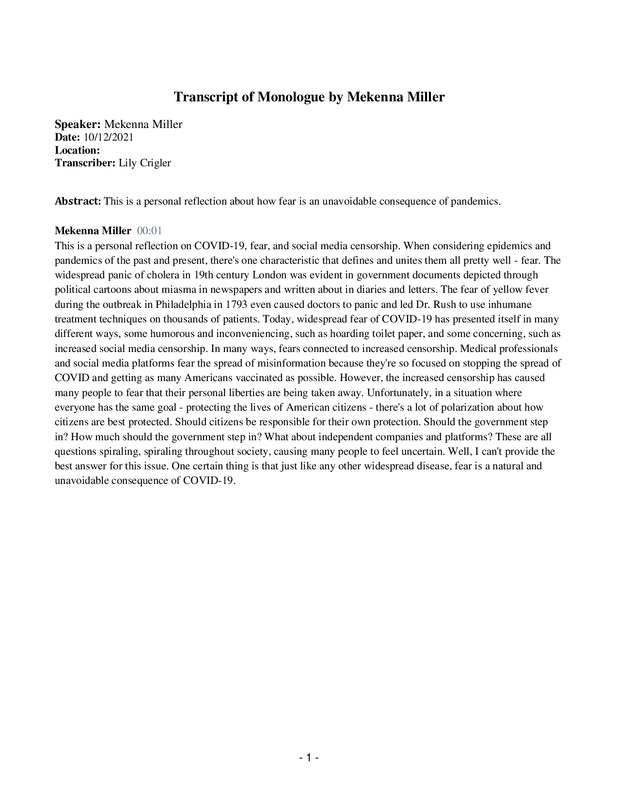 2021-10-12
2021-10-12Mekenna Miller Oral History, 2021/10/12
This is a personal reflection about how fear is an unavoidable consequence of pandemics. -
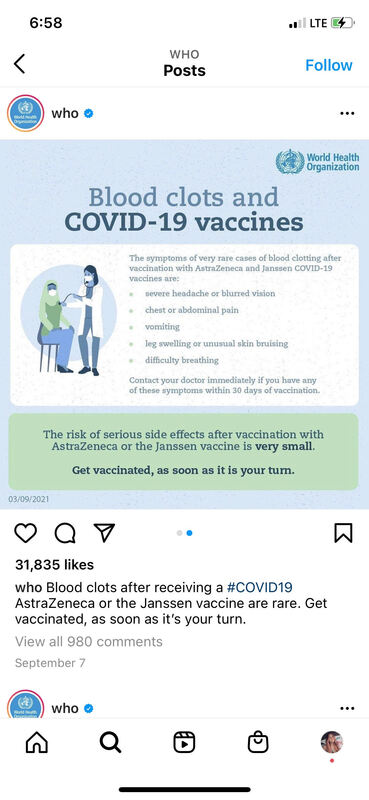 2021-09-07
2021-09-07Thoughts on Covid-19 Vaccine and Blood Clots: Social Media Screenshot
As someone who has studied the history of disease and epidemics, I know that disease causes widespread fear and panic. The uncertainties and unknowns of disease cause people to question themselves, others, and even medical professionals. Sometimes, questioning and being skeptical is what saved lives. For example, questioning Dr. Rush's treatment methods in the yellow fever epidemic of Philadelphia or questioning miasma theory during the outbreaks of cholera in London. Recently, there have been cases of blood clots as a result of the Covid-19 vaccine. This is a screenshot of what WHO has to say about the blood clots and a comment from myself. While I would love to get the vaccine, and I was originally hopeful about getting it, I'm not too scared and unsure what to do. Although WHO says cases of blood clots are rare, there are still many people like myself who are skeptical and only want to make the right decision for their own health and life. With talk of possible mandated vaccines, I am uncertain about what the future will look like for me and others like me. -
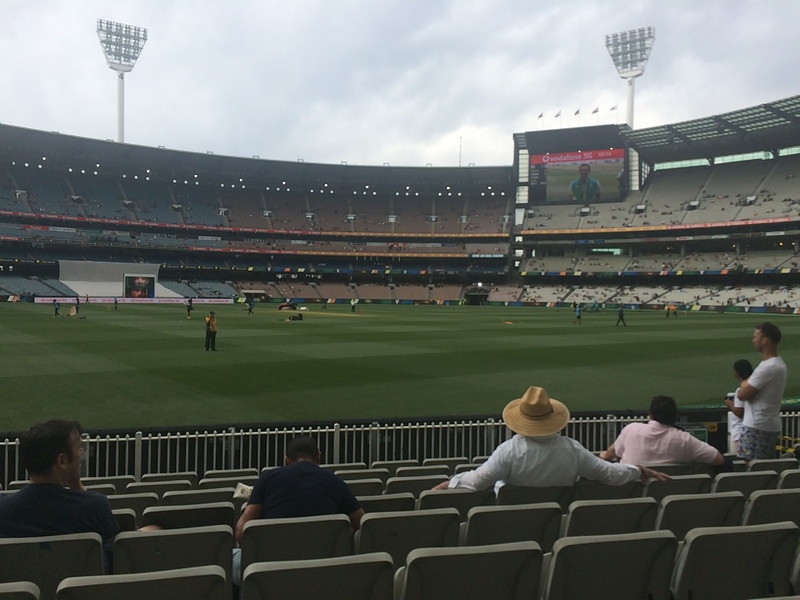 2020-12-27
2020-12-27Boxing Day Test at the Melbourne Cricket Grounds
Despite most activities being cancelled due to restrictions, I was lucky enough to score four free tickets to the Boxing Day Test cricket match in Melbourne at the MCG, and I brought three of my friends to the match. It was actually my first time at a live sporting event, so it was particularly memorable for me. Rather scarily, we soon found out a few days later that one of the spectators on that day would later test positive for COVID-19, leading me to take a COVID test myself, which thankfully turned out to be negative. -
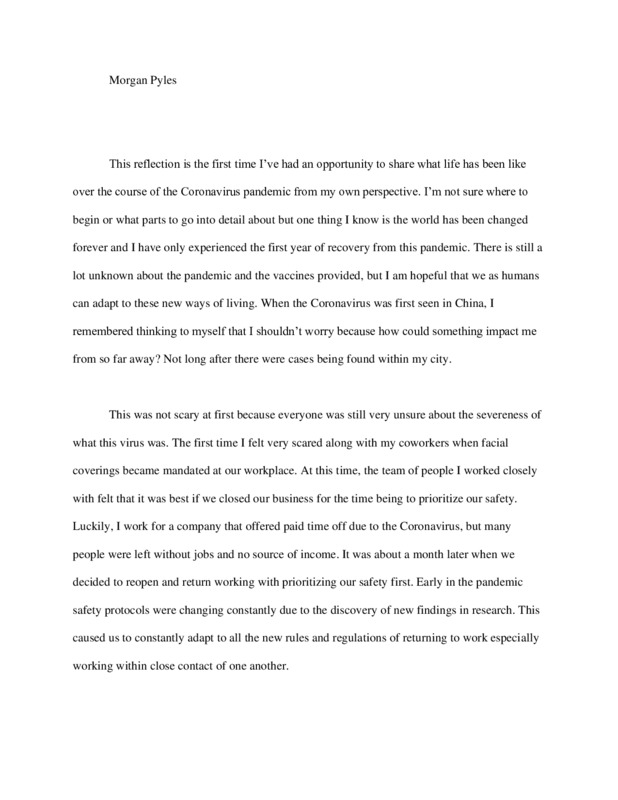 2021-10-04
2021-10-04How Covid-19 Has Changed My Life
The reflection that I have uploaded is a short summary of the biggest impacts Covid-19 has had on my life. This was the first time I've had the opportunity to share how Covid-19 has affected my life and I hope my experience helps others understand what life was like during these times. This submission is important to me because I want people 50 years from now to be able to read this and know how this pandemic has changed the world and how adaptable humans can become. -
2020-04-16
Happy Birthday...
Today is April 16th, 2020. Instead of waking my mom up with breakfast in bed, she sends me a photo of herself layered in protective gear. At the time my mother was working at one of the largest hospitals in Queens. She went from working four days a week to working six-seven days a week as the rates of COVID-19 hospitalizations increased. Today is her birthday and instead of celebrating life, she is surrounded by fear, death, and uncertainty. Thank you Mom for being strong and putting your life at risk as an essential worker. Happy Birthday -
2020-03-20
The blurry year
I just started at Brooklyn College as a transfer student from Citytech. The semester was only like 5 weeks in when we started seeing reports of the Covid 19. Then the school closed for a day and we were told it only be for a short amount of time, we all know how that went. I haven't been on campus since that last day. There was so much unknown at the time with everything. How long we were going to be away from school, what was the deal with Covid 19, how dangerous was it, and how we were going to survive. At that point, everything closed, and the city was so quiet for the first time in my life. I came out a different person after the lockdown. It was a scary time for a lot of people. It felt like everyone was struggling with something. My biggest thing was just trying to make the best of the situation. and that's what I still do to this day.
